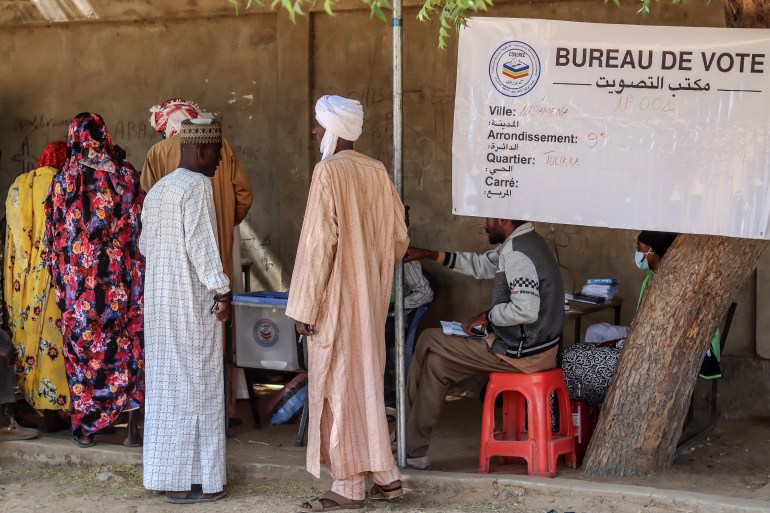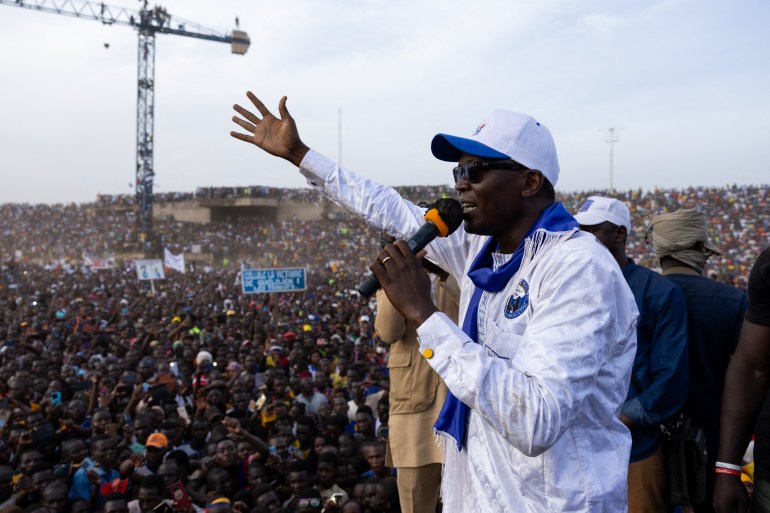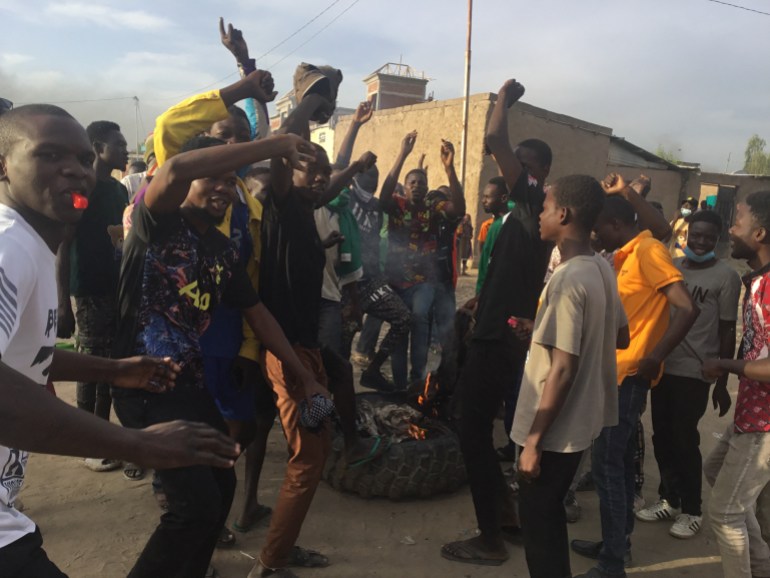Chadians go to the polls on Monday to elect a new president. This could be the country’s most-watched election in three decades.
The elections mark the end of the transition to democracy by the ruling military government, one of several currently in power in West and Central Africa. But some experts say the vote only serves to formalize the military’s seizure of power.
Chad has been in the midst of political unrest since 2021, when interim President Mahamat Idriss Deby first seized power, enduring fierce resistance from opposition forces who questioned his legitimacy.
In February this year, chaos escalated after government troops fatally shot Yaya Dillo – one of the strongest opposition figures – and his supporters at their party headquarters in the capital N’Djamena.
At the same time, Chad is one of the poorest countries in the world, with at least 40 percent of the 17 million inhabitants living below the poverty line. The war in neighboring Sudan has also pushed more than 500,000 people into Chad, adding to the pressure even as fears of the conflict spilling over simmer.
Chad’s army, considered one of the best in the region, wields influence in the restive Sahel, where incursions by armed groups and a wave of coups have sparked regional divisions and weakened the standing of Western powers such as France and the United States.
“[Chad] is an important security partner in the fight against [armed group] Boko Haram around Lake Chad,” said Dan Eizenga, a researcher at the Africa Center for Strategic Studies (ACSS). “So the electoral process in Chad has significant implications not only for Chad but for several countries.”
France, a key supporter of Chad’s current government, has a large military presence in the country. However, the USA appears to be on shaky ground. Last month, the Pentagon announced it would withdraw about 75 troops stationed in the country, but added that the decision could change after the election – underscoring the importance of the May 6 election beyond the continent.
A second round of voting is expected on June 22nd, with preliminary results expected on July 7th.
Here’s everything you need to know about the candidates and where things stand before Monday’s vote:
Who is running?
The country’s Constitutional Council approved 10 candidates in March, despite strong criticism that some opposition figures were excluded because of “irregularities” in their applications.
The main candidate, General Mahamat Idriss Deby, is the interim president who came to power under the ruling Patriotic Salvation Movement (MPS) party. He will run under the United Chad coalition, which includes several other pro-government parties.
Deby, 39, took office in April 2021 after his father, President Idriss Deby, was killed fighting a rebel group in the north of the country. By the time of his death, Deby had ruled for more than 30 years.
After the elder Deby’s death, the military suspended the constitution and announced a decree establishing an interim military council to run the country for 18 months, appointing Mahamat Deby as chairman of the council and therefore head of state.
Deby is one of Chad’s youngest leaders, but his critics were unimpressed and have criticized him since day one for the illegal seizure of power and called on him to resign. According to the constitution, the speaker of parliament should decide in the event of the death of the president.
Instead, Deby extended the transition period by several months until October 10, 2024. In order to legitimize his position, according to experts, Deby signed peace agreements with important opposition figures in 2022.
He also proposed changes to the constitution in a referendum. In December 2023, Chadians voted “yes” to new measures such as the creation of local councils to transfer power from the center; a reduction in the presidential term of office from six to five years and a reduction in the age limit from 40 to 35 years, as well as strengthening the electoral authority through its independence from the government.

Who are the main opposition figures?
Deby’s three-year rule is reminiscent of his father’s style: iron fist and harsh repression of the opposition, such as during the October 2022 protests.
Key opposition leaders were harassed or, worse, killed, like Yaya Dillo, a cousin of Deby. Saleh Deby Itno, another relative of Deby who was allied with Dillo, was imprisoned.
Meanwhile, Deby has attempted to co-opt other opposition members and appoint them to high positions, a strategy that the elder Deby also often used.
The main approved opposition candidates for the elections include:

Successful, Masra – Masra, Deby’s appointed prime minister and a Harvard- and Oxford-educated economist, was the strongest opposition figure until his appointment in January 2024, fighting under the Transformers Party (Les Transformateurs). He was a member of the vocal opposition coalition Wakit Tama, which began protesting the elder Deby’s long rule in 2021. After the death of Deby senior and his son’s seizure of power, Masra led opposition protests against a so-called “coup”. . He fled the country to the United States after the army opened fire on hundreds of protesters in N’Djamena on October 20, 2022, after Deby announced he would run in elections rather than relinquish power. At least 50 people were killed.
However, Masra returned to Chad in December 2023 following peace talks with Deby’s government, which is overseen by the regional bloc the Economic Community of Central African States (ECCAS). He was appointed prime minister on January 1, 2024 – a move that was heavily criticized by other opposition groups who said Masra had joined the military government. On May 6, Masra will face his boss and run under the Justice-Egalite coalition. It is the first time in the country’s history that a president and a prime minister are contesting elections, and there is speculation about whether Masra will run for Deby.
“Many observers suspect that they could have some sort of gentlemanly deal where the winner appoints the other as prime minister, thus maintaining the status quo,” said ACSS’s Eizenga. “Several opposition parties … claim that Masra gives the illusion of electoral competition.”
Albert Pahimi Padacke – A two-time former prime minister and former presidential candidate under the elder Deby, Albert will run under the semi-opposition party RNDT-Le Reveil or the National Assembly of Chadian Democrats, which has allied itself with the elder Deby’s political party at the time. He came second in the last presidential election in April 2021.
The other candidates are:
Alladoum Djarma Baltazar – a politician and founder of the Chadian Socialist Action Party for Renewal or Action pour le renouveau du Tchad (ASTRE). He also ran for president in the April 2021 election, which the elder Deby won for the sixth time just days before his death.
Theophile Bongoro Bebzoune – a teacher and president of the Rally and Justice Party in Chad or Rassemblement pour la démocratie et le progrès (PRET). He is a member of Deby’s interim council.
Lydia Beassemda – the first and only female candidate and the current Minister of Education. Beassemda will run under the Party for Democracy and Independence or Parti pour la drmocratie et l’independance integrales. She ran for the first time in 2021, but only received three percent of the vote.
Mansiri lopse creo – will run under the Elites (Les Élites) party. He is an engineer and a first-time candidate with growing support in northern and eastern Chad.
Brice Mbaimon Guedmbaye – is running in presidential elections for the third time. He will run under the banner of the Movement of Chadian Patriots for the Republic or Mouvement des patriotes tchadiens pour la République (MPTR).
Yacine Abdermane Sakine – a 39-year-old banker who is popular with the youth. Although Yacine belongs to the Reform Party (Parti Reformiste), he is also a member of the Wakit Tama opposition coalition and was arrested during protests after the military seized power in 2021.
Nasra Djimasngar – an academic running for the first time for his New Day (Un Jour Nouvel) party.

A free and fair vote?
Some experts say the elections are merely a formality to help Deby secure his power. Since the assassination of Dillo and the co-optation of Masra, there has not been enough time to produce another strong opposition figure.
“The very advantage of incumbency in this context makes Deby’s race a loser, and that assumes this is done within the framework of Chad’s electoral laws,” Eizenga said. “Consequently, Masra and Deby are really the only candidates expected to receive a significant share of the vote.”
Although Deby’s government established the National Electoral Management Agency and the Constitutional Council in January as part of new reforms agreed during peace talks with opposition members, critics say these agencies will toe the ruling party’s line since some of their commissioners were chosen by President Deby.
Chad’s already weak economy has shrunk over the last decade – gross domestic product (GDP) per capita, for example, fell from $961 in 2014 to $710 in 2019, according to the World Bank. Insecurity and an over-reliance on oil revenues are the main causes. Although oil is Chad’s most important resource, production is expected to decline sharply due to limited reserves.
With Deby winning the election, Chad could see another decades-long strong ruler as well as a stagnant economy.
“I suspect that we can look back over the last six years or so and get a good idea of what the next six years will look like: essentially a severely distressed economy.” [and] There is a high level of corruption that benefits more or less the same networks of politically connected people,” said Eizenga.
However, there is hope that Prime Minister Masra, a world-class economist, could influence more investment in the country’s education and health sectors.
